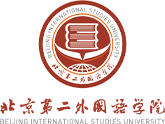
Liu Aibin, a Master's student in the English Language and Applied Linguistics program (Belt and Road Initiative research direction) at the School of English Language, Literature and Culture at Beijing International Studies University (BISU), recently won BISU's President Medal.

Liu Aibin wins BISU's President Medal.
She has published three papers in Core Journals, one theoretical article in the Guangming Daily, co-authored a blue book, led three university-level research projects, and presented papers at forums in prestigious universities such as Tsinghua University, Peking University, and Renmin University of China.
Liu is dedicated to the frontier field of "global language governance". In her view, language is not just a tool for communication but also a pathway for understanding the world and responding to the demands of the times.
Her interdisciplinary research journey started during a summer camp at BISU's China Academy of the Belt and Road Initiative when she was an undergraduate majoring in French. While reading articles on "constructing national discourse power", she realized that language is far more than a communication tool — it shapes worldviews, mediates cross-cultural understanding, and projects national identity, embedding both social cognition and political will. This insight inspired her to bridge her academic background with broader societal imperatives, ultimately leading her to pursue graduate studies in a different field aligned with national priorities.
This decision entailed dismantling her existing knowledge system and rebuilding it to delve into the fields of foreign language studies and international politics from a fresh perspective. She admitted to self-doubt during this transition, yet she firmly believes that "language is not only the foundation of the humanities but also a key dimension for explaining international relations and supporting global governance".
Looking back on her journey, Liu realizes that she has evolved from a mere language learner to a cross-disciplinary explorer with a critical consciousness and humanistic care. This transformation was not without its challenges, but each obstacle helped shape her into a more mature thinker.
Liu's mentor, Zhang Yaojun, has guided her to approach research from a problem-oriented perspective, focusing on real-world issues and national strategies. Her peers are her most trusted comrades and they helped each other navigate through challenges. She also mentored the new students, with belief that it is not just about knowledge transmission but also about fostering an academic atmosphere.
Liu maintained an average score of 92+ in her courses, won numerous awards, and published several research papers, all thanks to her efficient time management skills.
She refers to this method as the "Three-Stage Time Planning Method": setting yearly goals such as "publishing core papers and participating in major projects", breaking them down into monthly milestones like "writing literature reviews and refining research methods", and daily tasks focusing on specific activities like "data organization and paragraph revisions". This hierarchical goal-setting approach has enabled her to maintain a high GPA while producing multiple high-quality outcomes.
"The fastest speed is not running but walking without stopping." The words from her middle school teacher Guo Jing has been her pillar of support during the uncertain journey of research, making her believe that every step taken diligently will eventually yield results in the future.
Liu expresses several expectations for her future self during doctoral studies: maintaining a problem-oriented approach, avoiding formalism, expanding her language research into the broader international political landscape, staying true to her original intentions and steadfastly pursuing her passion.
She has focused her doctoral research on the "triangular interaction of discourse factors, technological innovation, and national security".
Reflecting on her academic journey, each of her choices has revolved around the central theme of "language serving national strategies".
During her journey from linguistics to global language governance, she has constantly challenged herself to remain sensitive to "real problems", using academic language to respond to the demands of the times, and employ language as a tool to understand the dynamic world.

Links
